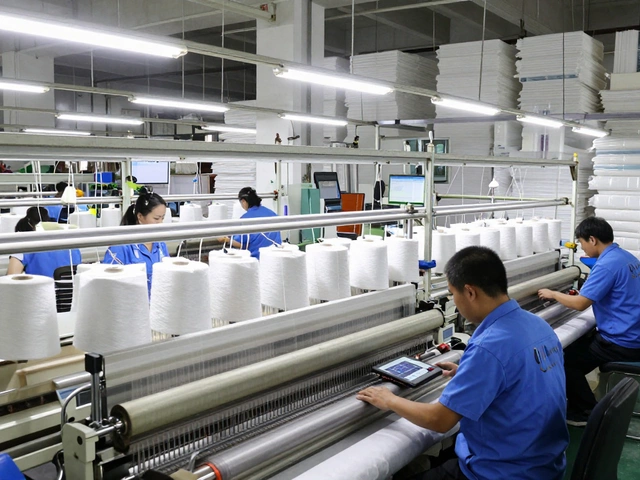Small Scale Industries: Why the Focus Matters Most

Small scale industries are everywhere, quietly making things run in the background. These are the businesses that give us things like custom-made furniture, local snacks, or auto parts from a workshop, not a giant factory. They might look tiny compared to big brands, but they deliver jobs and fresh ideas that shake up the market.
Most people don’t realize that SSIs provide a massive chunk of jobs in countries like India. It’s estimated that over 100 million people work in these setups. If you ever wondered why there’s such a focus on them, it’s because they’re the backbone where new skills are learned and families get their start.
One big reason for the buzz is how these industries make it easier for regular folks to start something of their own. Ever seen your neighbor turn their baking hobby into a business? That’s SSI in daily life. Tech has only turbocharged this growth, with simple machines, online sales, and digital payments helping people launch businesses from their garages or small rented spaces.
- What Small Scale Industries Really Do
- The Big Impact on Local Lives
- Hurdles on the Small Business Highway
- Tips to Get Ahead in Small Scale Manufacturing
What Small Scale Industries Really Do
When it comes to small scale industries, it's not all about big factories and massive machines. We're talking about workshops with 5-50 workers, units run from homes, or small rental spaces. These businesses cover a ton of things, from making simple products like toys and baked goods to assembling engine parts or creating local fashion items. They might use traditional tools, or just a set of reliable machines, but they churn out what you need, often at prices that big brands can't beat.
The reach of these businesses is wild. Nearly every town or city in India has clusters of small scale industries—like Ludhiana's bicycle parts workshops or Surat’s diamond cutting units. They cater to day-to-day needs, supply to bigger manufacturers, and sometimes even export directly to other countries. In fact, the MSME Ministry reported that small scale industries accounted for about 45% of India’s total exports last year. That's massive, considering their average size.
What really stands out is how adaptable they are. Need something customized? SSIs can make it. Want something produced in a smaller batch? They’ve got you covered. They jump on new trends fast, because the team is tight and decisions don’t get stuck in endless meetings. This flexibility helps them try out new ideas, whether it’s a new flavor of snack, a trendy piece of jewelry, or a part for an electric rickshaw.
If you’re thinking these businesses just mean low-tech, think again. Many are tapping into digital tools: selling on online marketplaces, using e-wallets for payments, or managing orders through simple apps. This isn’t just for show. It means they can connect with customers, even those who don’t live nearby, and keep costs down. Nearly 60% of small manufacturers said digital payments helped them stay afloat during tough times, according to a 2023 survey.
| Product Type | Typical SSI Example | Where They Sell |
|---|---|---|
| Textiles | Handloom sarees from Tamil Nadu | Local markets, online, exports |
| Food Processing | Homemade snacks (namkeen, pickles) | Retail shops, online platforms |
| Engineering Components | Auto parts in Pune | Larger factories, direct sales to other businesses |
| Jewelry | Silver bangles in Rajasthan | Shops, online jewelry stores, exhibitions |
The job market would look totally different without small scale industries. They hire workers fresh out of school and help train them up on the job. Most dropouts or those who don’t have college degrees get their first stable paycheck here. It’s also a space where families work together—parents, siblings, cousins—running a unit side by side.
Small scale industries aren’t just a backup option. They’re where genuine entrepreneurship starts, and where local economies get a real kickstart. If you're dreaming of getting into manufacturing or just want to support a local business, these industries make a bigger impact than you’d guess at first glance.
The Big Impact on Local Lives
If you ask anyone working in small scale industries, they’ll tell you how much these businesses shape their town or neighborhood. Unlike big factories that set up shop far away, SSIs usually hire people from just a few kilometers away. A lot of families rely on these jobs not only for income, but also for skill development and stability.
Here’s a cool fact: in India, about 40% of the country’s manufacturing output comes from MSMEs (micro, small, and medium enterprises). That’s huge. Without them, people would have to move to bigger cities hunting for work, but SSIs let them stay near home while earning a living. It doesn’t just create jobs; it keeps local traditions, crafts, and special skills alive. For example, handloom weavers or small food processing units usually pass down methods from one generation to another. It’s culture and livelihood rolled into one.
Ever noticed how towns with strong SSIs bustle with energy? Local shops and schools benefit because more people have steady incomes. The money earned here usually gets spent here, keeping the whole area buzzing. A study by India’s Ministry of MSME (2023) found communities with a high density of small manufacturers see better improvements in local roads, healthcare, and education, simply because people can pool resources and work together for local causes.
| Contribution | Details |
|---|---|
| Job Creation | Over 100 million jobs provided in India alone |
| Local Production | Nearly 6,000 products made by small manufacturers |
| Exports | 45% of India’s total exports come from MSMEs |
But it’s not just numbers. The real win is that SSIs empower everyday folks. They help women set up home-based businesses, give school leavers real skills, and let entire families see a future without having to move cities. Want to see positive change in your own community? Supporting local small scale manufacturing might be the most direct route.

Hurdles on the Small Business Highway
Running a small scale industry isn’t as simple as making cool products and selling them. Most small businesses run into walls that big companies barely notice. Let’s talk cash flow first. Getting a loan from a bank can feel harder than landing on the moon. Lots of banks still see these businesses as risky, even when their books look fine. Around 40% of small manufacturers in India say they have a hard time getting formal credit.
Then there’s paperwork. The amount of forms and regulations, from registering the factory to paying local taxes, eats up serious time and money. Many business owners say filling one wrong detail can hold up work for weeks. And don’t get me started on licenses – you need a small pile of them even for home-based food production!
Tech can help, but it also creates a gap. Some owners still rely on pen and paper, missing out on easy wins like digital payments or online marketing. Without basic digital skills, they lose customers who expect instant answers or want to pay with UPI, not cash.
Let’s check out some of the biggest struggles small industries face:
- Getting Enough Working Capital: Hard to buy materials or pay salaries if banks won’t lend easily.
- Finding Skilled Workers: Many skilled people aim for bigger companies. Training newbies takes time and cash.
- Dealing with Red Tape: Taxes, licenses, safety rules—missing just one piece can shut down the shop.
- Coping with Big-Brand Competition: Giants spend tons on ads and cut prices, making it tough for small businesses to survive.
- Handling Unreliable Suppliers: Late or low-quality raw materials throw off the whole schedule.
Here's a quick comparison of challenges reported by small manufacturers in India as of 2023:
| Challenge | Percentage Facing Issue (%) |
|---|---|
| Access to Finance | 40 |
| Skilled Labor | 25 |
| Regulation Complexity | 22 |
| Tech Usage | 18 |
| Big-Brand Competition | 15 |
None of these problems are small, but that’s what makes wins in small scale manufacturing feel so rewarding. With the right support, these hurdles aren’t dead ends—they’re just tough speed bumps.
Tips to Get Ahead in Small Scale Manufacturing
Getting ahead in small scale industries isn’t about having the fanciest machines or the biggest team. Instead, smart planning, a hands-on attitude, and a good eye for opportunity really make a difference. Here are some key tips to help your business stand out and grow steadily.
- Keep It Lean: Don’t overstock raw materials or finished products. Think small batches and just-in-time purchases. This reduces waste and ties up less cash.
- Upgrade Your Skills: Stay on top of new techniques and digital tools. Free online courses or YouTube tutorials on machinery, marketing, or even accounting can change how you run your operation.
- Focus on Local Demand: You don’t have to serve the entire country. Listen to what people in your area want and fill that exact need. Local bakeries, custom clothing shops, or handmade home décor sell best because they fit right in with community tastes.
- Use Government Schemes: Governments often run schemes for MSMEs (Micro, Small, and Medium Enterprises) like subsidized loans, tax benefits, or tech support. For example, the Indian government’s "Udyam" registration gives small businesses access to easier credit and support services.
- Team Up with Other Small Players: Partner with other small units for bigger orders or to share transportation costs. This is super common in garment manufacturing or food processing hubs.
Think about how most new jobs in India over the past five years have come from small scale manufacturing and services. Just look at these numbers:
| Year | Share of New Jobs from SSIs (%) |
|---|---|
| 2020 | 34 |
| 2021 | 38 |
| 2022 | 42 |
| 2023 | 45 |
This steady climb shows that getting things right in small manufacturing really pays off.
Finally, always keep your customers close. A WhatsApp group or a simple survey after sales can quickly tell you what people like or what needs to change. That constant feedback loop? It’s gold, and that’s what keeps a small scale industry nimble where big companies get stuck.

